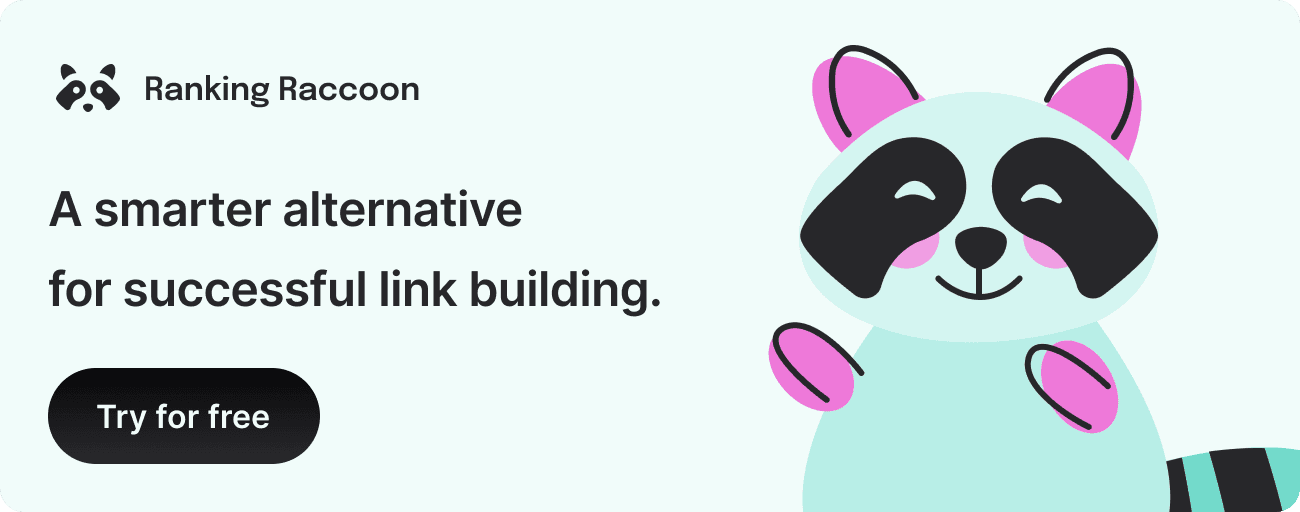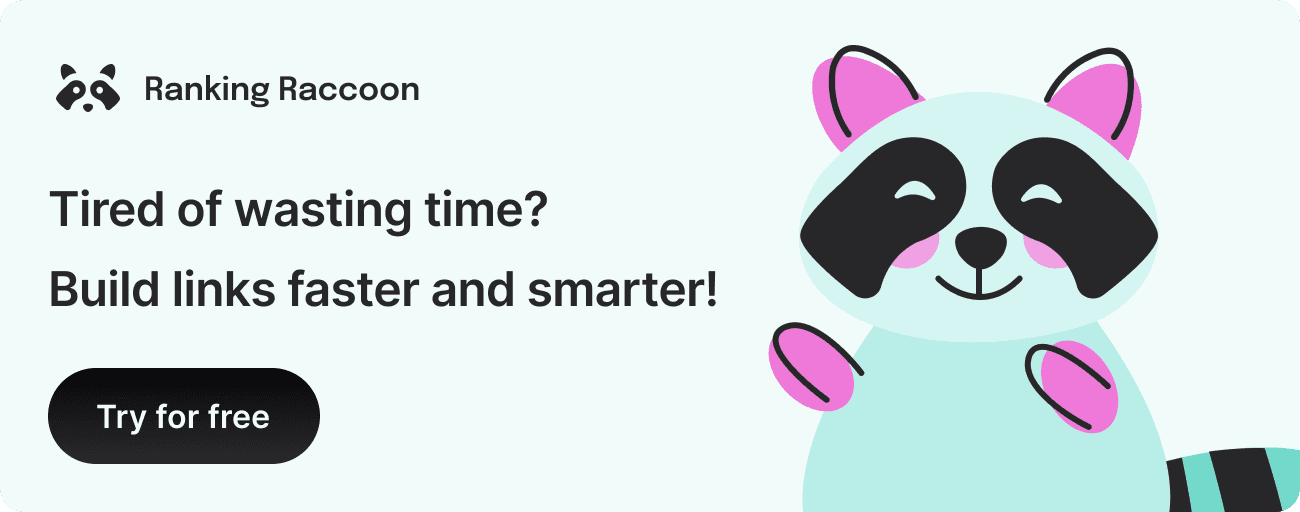Everything You Need To Know About Link Buying

Eliza Forgacs
The link building landscape is changing. As of 2025, acquiring free backlinks is harder than ever. Your outreach emails remain unanswered, or worse: publishers ask for money in exchange for putting your link out.
Surrounded by hardships, many SEO professionals feel pressured to consider buying backlinks despite the risks—especially in competitive niches like SaaS.
One question arises: can we really keep our hands clean in 2025?
In this article, we’ll break down:
- What link buying means and how it works
- Google's official policy and legal implications
- The types of paid links and the truth about free backlinks
- How buying links in the SaaS industry differs
- How Ranking Raccoon offers a safer alternative
By the end, you’ll have a clear, data-driven view on whether link buying is worth the risk, or should you look for safer alternatives.
What is Link Buying? (The Answer is More Complex Than You’d Think)
Buying links sounds pretty straightforward, right? You pay someone and they give you a backlink in exchange for the money.
Well, in reality the situation is a bit more complicated. Imagine link buying as a sliding scale between legitimate marketing methods and outright algorithm manipulation. And interestingly the middle area is where most of the link building happens and where most SEOs operate today.
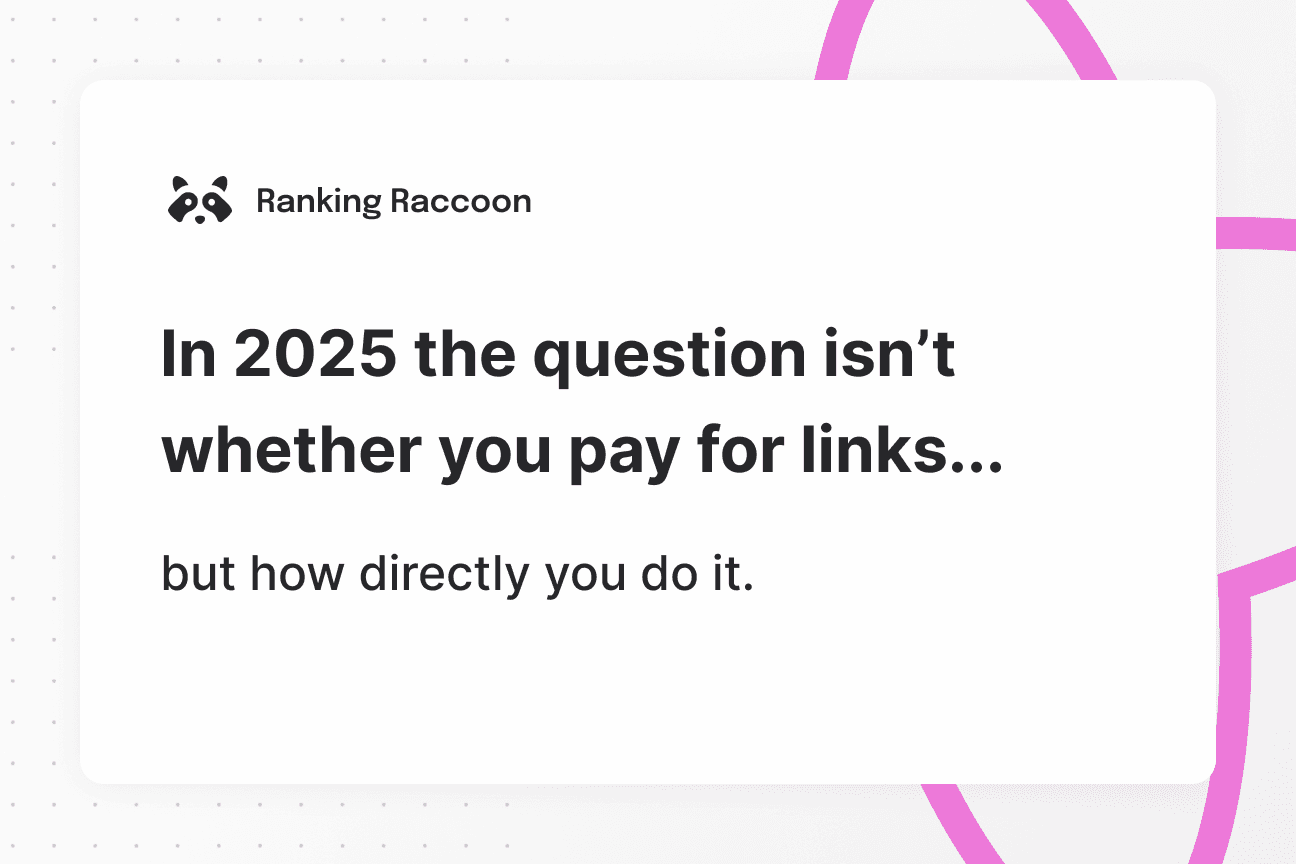
Link Buying vs. Link Earning
Let’s be honest: in 2025, the line between “earning” and “buying” links is blurrier than ever. When you pay a freelancer to reach out and pitch your content, or a PR agency to secure mentions, aren’t you technically paying for links? Even creating top-tier content has a cost attached: time, tools, promotion. So the question isn’t whether you pay for links, but how directly you do it.
- Direct link buying means paying explicitly for link placement. (e.g., $150 for a guest post on a DA 60 site.)
- Indirect link buying is when you pay for exposure that results in links. (e.g., PR campaigns, sponsorships, digital outreach.)
- Link earning happens when your content is so valuable others link to it naturally… though in 2025, that’s a rather rare case.
I believe most successful brands exist somewhere in the gray zone, mixing paid tactics with relationship-based link building. They focus on great content, operational strategy and networking.
What is Google’s Stand on Link Buying?
Google hates paid links. At least that’s the official statement.
“Any links intended to manipulate PageRank or a site’s ranking in Google Search results may be considered part of a link scheme and a violation of Google’s spam policies.”
So according to Google’s Search Essentials (formerly Webmaster Guidelines); if money changes hands in exchange for a do-follow backlink, Google considers it manipulation. And if they catch you? Penalties, deindexing, sudden traffic nosedives, you name it.
But here’s where things get interesting.
In 2025, Google’s stance hasn’t softened—but its detection has evolved. Machine learning models and spam updates now evaluate link patterns on a much deeper level:
- Are the referring sites truly contextually relevant?
- Do the links appear editorial or just inserted there without thought?
- Is the anchor text suspiciously optimized or does it look natural?
- Does the site’s link profile show obvious footprints of manipulation?
So, while Google still waves the red flag at paid links, it’s no longer about whether you paid for it—it’s about how detectable and obvious that payment is.
Here’s the paradox every SEO knows but few admit out loud: Google says “don’t buy links,” yet the algorithm still rewards sites that… have them. That’s the industry’s open secret. Sites that buy links carefully, contextually, and strategically often see gains. Those that spam or over-optimize get burned.
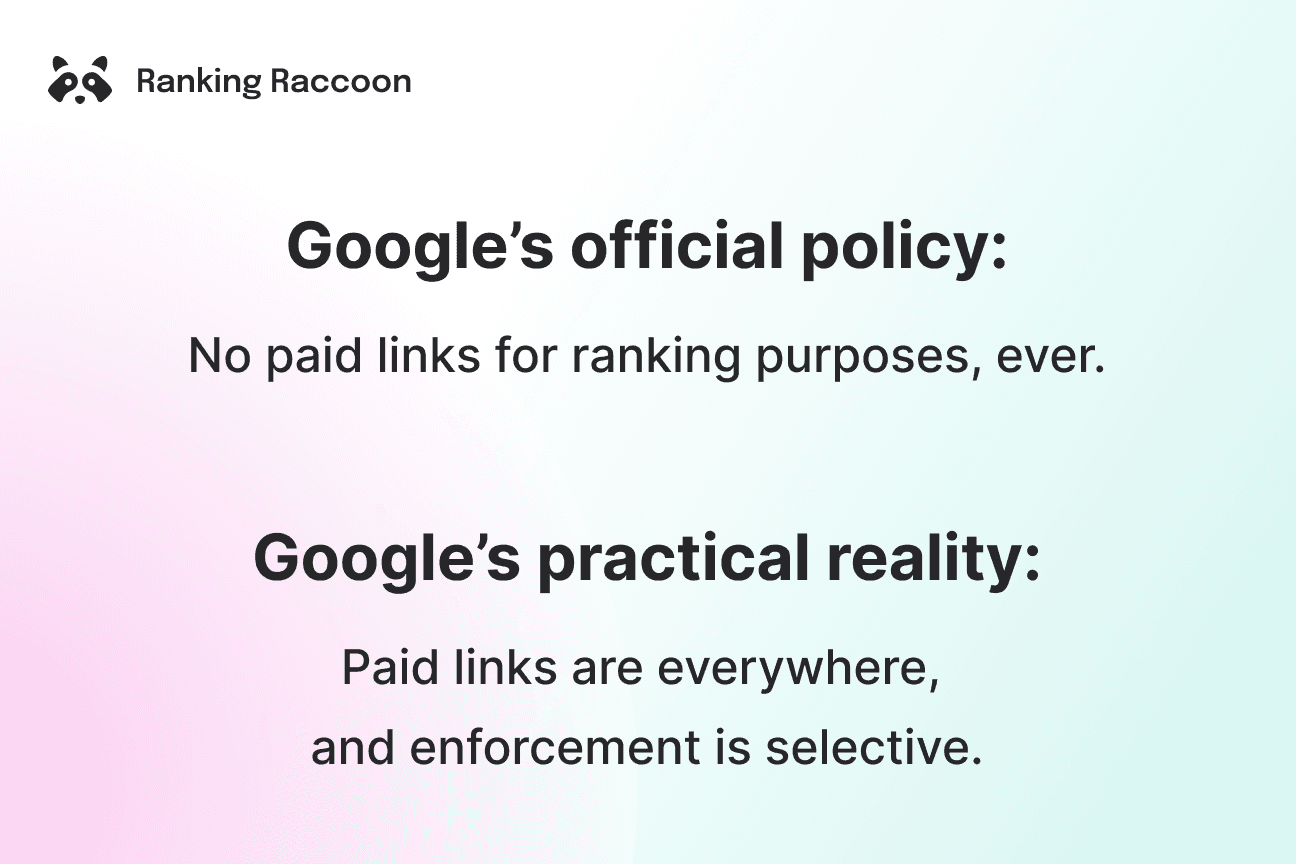
At the end of the day, Google isn’t trying to punish marketers for promoting their businesses. It’s trying to protect the integrity of SERP results.
An Ideal Solution: Ranking Raccoon
I feel you, you don’t want to risk your domain’s reputation, nor do you have the time to beg for backlinks that never come. You need something better, faster, smarter.
That’s exactly where Ranking Raccoon comes in. And don’t get confused, it isn’t another link-selling marketplace—it’s a thoughtfully curated networking platform for SEOs, marketers, and business owners. Building relationships is the most important goal of the community, here you can exchange links or guest post opportunities safely and ethically.
What makes it different? Great question!
- Membership-based model for a fair price:
You can use it for free with limited features, and if you decide it’s time to up your SEO game, you can unlock the full database and unlimited messaging opportunities for a subscription fee of $25/month. No extra payment needed for links or placements—actually paid links are forbidden on the platform.
- Rest assured—Manual quality control:
We manually check every site joining the platform, and look for red flags before approving the registration. We inspect the metrics, traffic, backlink profile, content and recurring topics of the website and don’t allow anything suspicious—like spam or PBNs.
- No more cold outreach fatigue:
Once you're in, you can message site admins directly in-platform, propose placements, and negotiate in a community built for link building. No more blasting generic cold emails and endless waiting for a response.
- Transparent and safe link exchanges:
You know where your links come from and where they go. Besides the vetted websites, every Ranking Raccoon user is verified with LinkedIn. When a link goes live, the platform (with the help of Ahrefs) can verify the link health and do-follow status.
- A mutually beneficial, ethical approach:
Ranking Raccoon encourages a mutually beneficial, “give and take” approach. We believe in the unspoken rule of link exchanges—if you get a link, give a link back. Of course, topical relevancy, DR number similarity and genuinely good placement matter.
In short: Ranking Raccoon gives you a safer, smarter way to build links, especially in competitive areas like SaaS, eCommerce, and design—with less risk and more control.
Keeping it Real: Everyone Pays for Links in a Way
The SEO world loves to pretend it’s black and white. Purchasing links is bad, earning natural links with your valuable content is good. But I think you start to understand that in real life it’s not that simple.
So when we talk about “link buying,” remember: it can cover more than just exchanging cash for clicks. It can be a guest post fee, a sponsored placement on a listicle, or even “coffee money” tip for a blogger to insert your link into their content. It’s transactional, but not always unethical—and not always obvious.
And sometimes it doesn’t even involve money. Sometimes you pay with your content, your time (or with your sanity). Let’s deep dive into the different scenarios and options which can happen while trying to acquire quality backlinks!
Actually Buying Backlinks (And The Risks That Come With It)
First of all: I’m not a fan of buying backlinks. It’s risky business, unpredictable, costly, and often not worth the long-term headache. There are better ways to grow your site’s authority, even if they take more time and patience. But if you decide to take a chance and stroll through the land of link purchasing, here’s what you’ll find:
1. Guest posting services—The “classic” paid route
This is when you pay websites to publish articles containing links to your site. Sometimes you write the content yourself; other times, a service handles it for you. It’s a relatively controlled and scalable method, but often the cost is really high. The risk? Many of these posts live on sites with weak editorial standards. If the content feels forced or low-value, you might end up paying premium prices for paper-thin links.
2. Niche edits—The sneaky insert
Niche edits (or link insertions) mean adding your link into an already published article. It can work well if the host site is relevant and the placement feels natural. To be honest, it’s more difficult to do at scale and is often seen as riskier by Google, because you pay by link or by placement every time.
3. Marketplaces—The wild west of link buying
Marketplaces are platforms that connect buyers with sites willing to sell link placements. I’d say it’s a high-risk choice, because these kinds of marketplaces usually contain low quality options and overall they are spammy environments with speculative ROI opportunities.
4. Private Blog Networks—Playing with fire
Holding a bunch of domains under your control to create backlinks for your “money sites”. Well, that’s an extremely risky business which often ends up in penalties. Despite the fast scaling potential of link building, it just isn't worth it. Once Google catches up, your entire network can go down in flames.
5. The PR leverage—Paying for sponsored content
I’d say sponsored content is not so risky, especially if you choose sites with real authority. In this case you’re paying for legitimacy and exposure, but it can be a two-way sword. It’s not just expensive, but a lot depends on the site you’re paying for. And another interesting POV is your audience’s view—when they see the 5th listicle about “Best AI software every SaaS company should use”—will they really believe what they’re reading? People outside of SEO berks also got familiar with shady methods, they can sense when something feels like a paid ad.
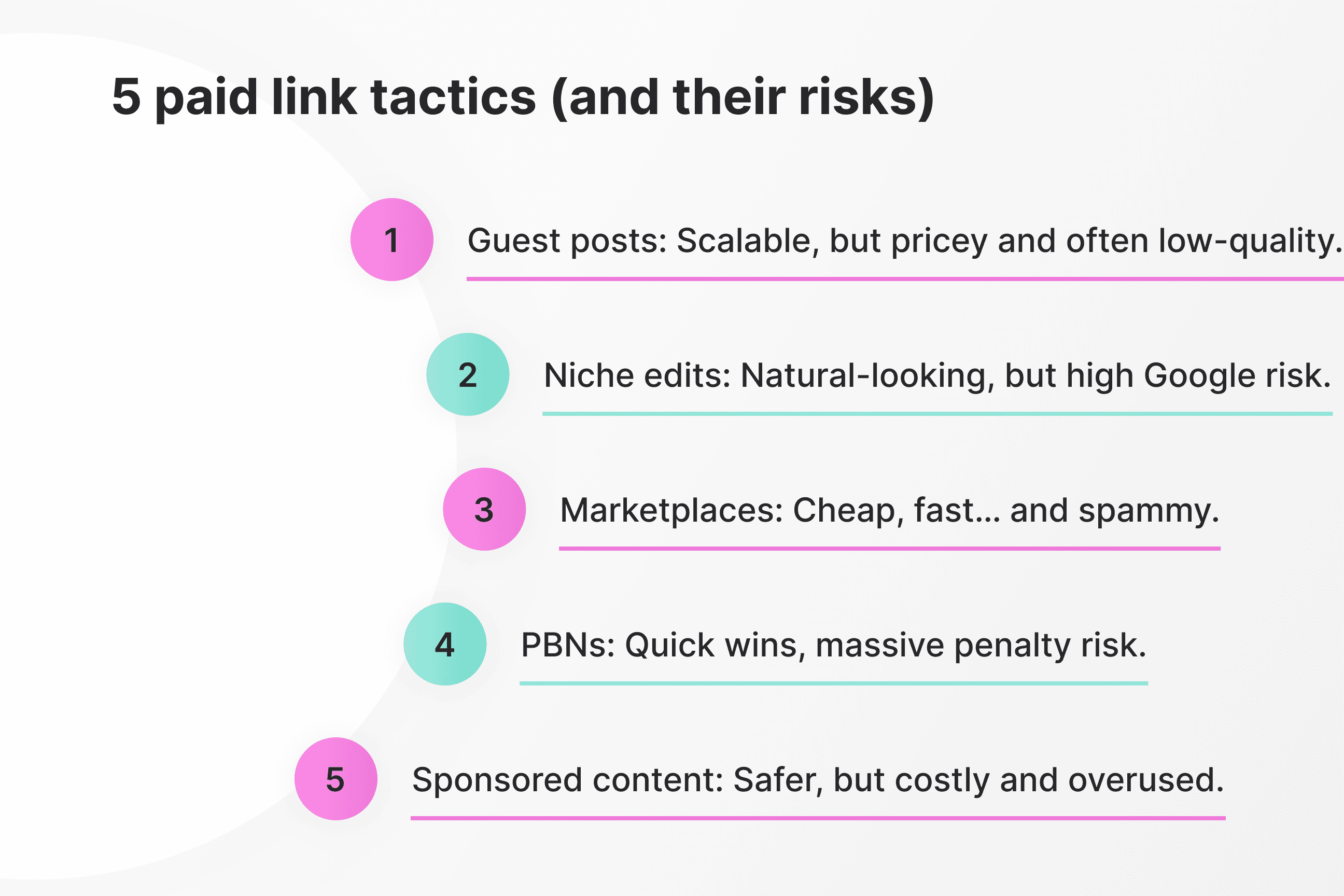
Outsourcing Your Link Building
So, we already talked about the ways buying backlinks work—that sometimes it doesn’t involve directly paying for links. Outsourcing link building is one of the methods where you spend (and spend and spend) money, but usually pour it in an agency’s or a freelancer’s pocket—with very little control over what happens next. Outsourcing is a game of trust: will they really find the high-authority backlinks you need to grow your business? So many agencies claim to deliver wild numbers every month, like 50 links from DR 80+ sites—but is this believable? I’ll tell you what’s more likely; from the 50 links 5 will be contextually relevant, and that’s even a generous rate.
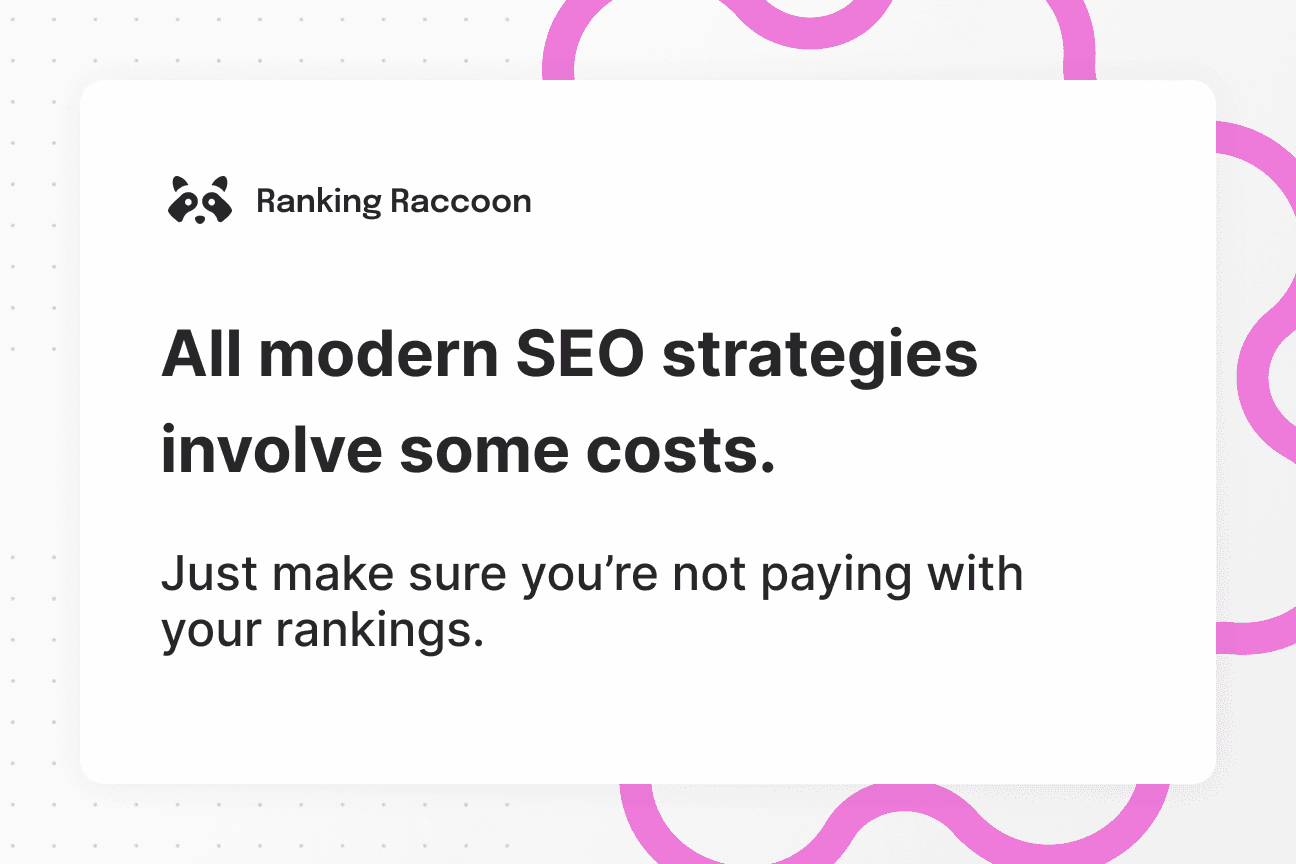
Free Backlinks: When You Pay With Your Time (and Sanity)
Even if you reject the concept of link buying, you’ll still pay—just in other currencies. Building links is notoriously time consuming, it requires high-effort with often low results. I’m confident to say that free link building is a non-existent idea, but let me present my point of view:
Endless Outreach Efforts
Prospecting and reaching out to publishers or site owners is hard. You almost feel like you’re wasting hours upon hours with very little outcome. Writing countless emails, following up, keeping tabs on what’s going can be a full-time job in itself. I think we’re all familiar with the best practices—like personalizing every email, offering something in return for the same value. Before actually sending your pitch checking relevance, DR and traffic numbers, etc. Lots of attention-demanding work with a response rate of only 5%.
Taking Content Creation Seriously
To have a chance at acquiring backlinks you’ll need high-quality content. Most likely you’ll keep a blog page up-to-date, and publish fresh content frequently. Doesn’t sound too complicated, but if you want to have success, there are steps you shouldn’t miss. Like keyword research, and getting familiar with on-page SEO. And also, you’d have to keep looking for themes your target audience would engage with, and something that’s in the meantime also worth linking to. Think of things like whitepaper research, fresh industry data studies, free online tools, step-by-step guides or useful resource pages.
Finding Reciprocal Link Building Opportunities
Reciprocal link building is a great way to gain backlinks. Basically it’s free, you pay for a link with a link. It’s also called link exchange, but works best if you partner up with link builders who have multiple sites—because Google tends to punish too many direct link exchanges. A bit of a loophole (and mutually beneficial) tactic is to engage in ABC link exchanges, which in a really simplified way means site A links to B, and site C links back to A.
You can read more about this here: Does Backlink Exchange Work? [A Guide for 2025]
Using The Right Tools
You won’t reach the stars without finding the SEO tools which work for you. There are too many to list them all, but you can find a few useful listicles on the Ranking Raccoon blog. So you have a wide selection, there are tools for conducting keyword research, keeping an eye on your metrics, managing your outreach efforts and of course the one and only Ranking Raccoon which delivers a safe and ethical way of exchanging backlinks.
Spending Time with Relationship Building
In today’s SEO landscape you just can’t escape networking. Relationship-based link building is one of the safest and most effective ways to upgrade your backlink profile and scale faster—that’s what Ranking Raccoon is all about. Instead of one-off links, try to mould lasting relationships with trusted link building partners. You should aim for a full network of professionals whom you could trust and exchange links regularly in a mutually beneficial way.
All of this is costly and time-consuming, and often yields lower volume or slower growth than paid options, especially in competitive niches. This is why many SaaS companies, in particular, find the “free” route increasingly painful.
The State of Link Buying in 2025: Fresh Trends and Statistics
The link-building landscape of 2025 looks nothing like it did even a few years ago. Once upon a time, you could earn backlinks through clever content, and a few cold emails. Today? Your outreach messages drown in crowded inboxes, publishers openly ask for cash, and “free” backlinks are becoming an endangered species.
To take a deeper look and understand where link buying really stands in 2025, we’ve pulled together the latest data from industry surveys, Reddit hot topics and most used SEO tools.
So what pictures do the numbers paint?
- 91.9% of SEOs believe their competitors buy backlinks.
- 74.3% of link builders admitted to buying links—when anonymity is preserved. Only 30% own up to it publicly.
- The average acceptable price for a quality backlink in 2025 is around $508.95.
- More than half of SEO professionals believe Google can’t reliably recognize paid links.
- 36% of businesses outsource link building, 25% with an average monthly budget of $10,000-$25,000.
- Since Google’s March 2024 updates only 6.6% of websites that bought links saw a positive change in traffic.
- The top 1 result in Google often has 3.8x more backlinks than pages ranked #2–#10, emphasizing the ranking importance of high quality backlinks.
Now let me help you work through the contradictions: Buying links may be riskier than ever, but it’s also more widespread, more expensive, and, for many, still impossible to ignore.
Best Practices with Paid Links (If You Really Must)
As you can see from the statistics, link buying happens way more frequently than we thought, right? You don’t have to explain yourself; budgets are tight, targets are ambitious, and competitors are doing it too. If you decide to go down that path, at least do it with a plan. Here’s how to minimize the risks:
1. Use them sparingly and strategically.
Paid links shouldn’t be your main acquisition channel. Treat them like seasoning, not the whole dish—something that complements a broader SEO strategy built on real content and relationships.
2. Keep them relevant and contextual.
A backlink should make sense within its content. If it looks out of place or screams “sponsored,” it probably won’t help, (might even hurt). Prioritize placements that genuinely fit your brand and topic.
3. Avoid over-optimized anchors.
Forget about stuffing exact-match keywords like “best SaaS CRM for startups” into your anchor text. Natural, brand-oriented anchors (“see how [Brand] compares”) are safer and look more organic to both users and Google.
4. Track performance and risk.
Keep an eye on your backlink profile, rankings, and traffic. Tools like Google Search Console, Ahrefs, or Semrush can alert you to sudden drops or suspicious link patterns—and help you disavow toxic ones before Google does.
5. Disclose and tag properly.
Always mark paid links as rel="sponsored" or rel="nofollow". It’s not just about playing by Google’s rules—it’s about protecting your brand’s credibility and your partners’ trust.
And finally, remember: the best SEO strategies don’t depend on secrecy or loopholes. They depend on authentic visibility—the kind that communities like Ranking Raccoon help you build naturally, through collaboration and mutual value, not transactions.
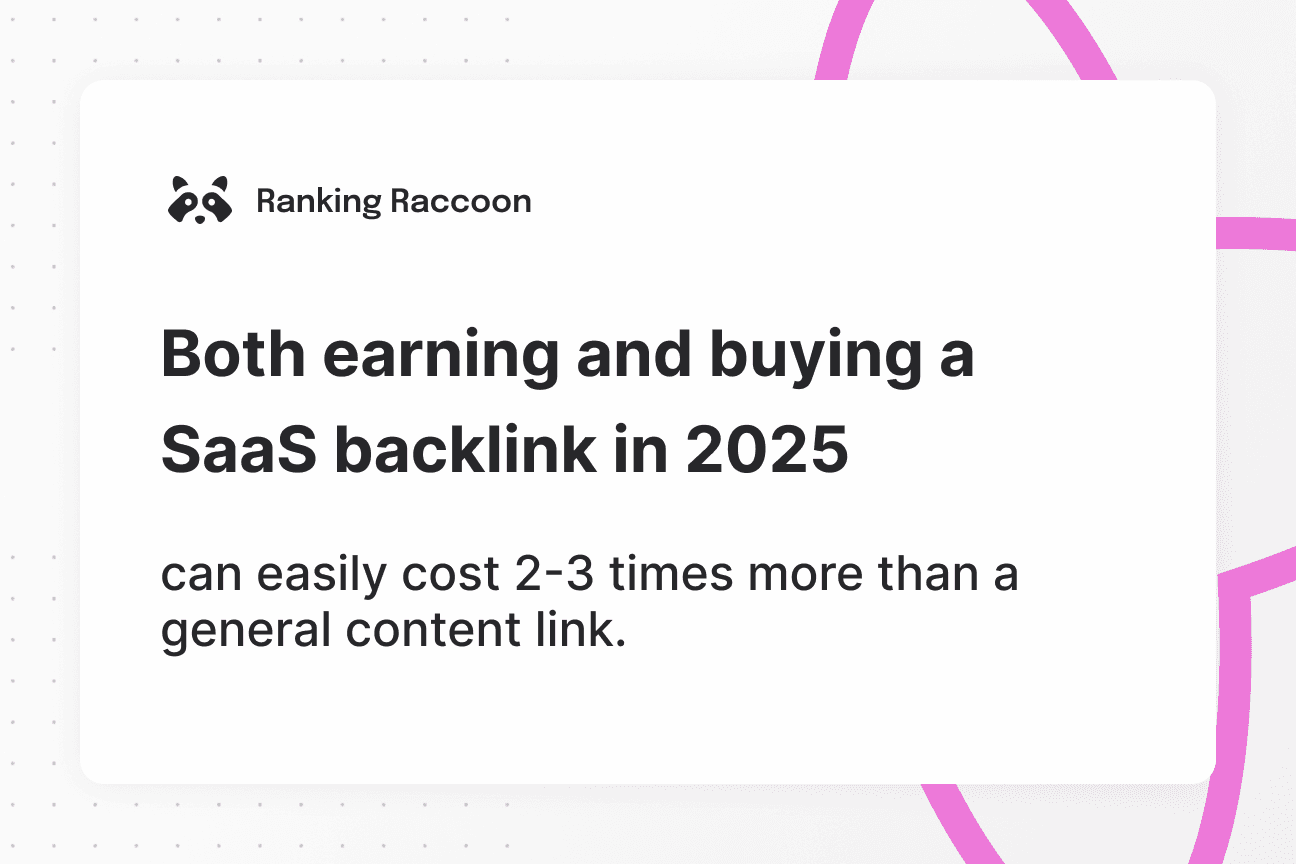
SaaS Backlinks: Why So Special?
Wanna know why link building for SaaS is especially “fun”? Because if there is one niche that makes building links both an art form and a full-time headache, it’s SaaS. Let’s dig into the reasons why!
Fierce Competition
For starters, competition is brutal. Many SaaS companies target similar keywords and audiences, like “project management tool” or “email automation”. It’s not just the fact that they chase the same keywords, but also everyone’s pitching to the same websites and publishers for gaining quality backlinks.
What does this mean? An increase in link price and keyword difficulty, which results in even higher expectations to rank. So earning (and of course buying) a SaaS backlink in 2025 can easily cost 2-3 times more than a general content link.
Relevance Matters Even More
Acquiring a backlink from a lifestyle blog might be helpful for a B2C consumer brand, but for a SaaS business? It’s practically useless. Taking Google’s evolving algorithm into account, if your link doesn’t fit contextually into the environment, it won’t add any real value to your backlink profile. It’s no more than some background noise.
Stricter Content Rules
There are different expectations regarding a SaaS site’s content. While many industries can rely on listicles and a few PR mentions, SaaS link building thrives on in-depth content. You’ll need fresh case studies, tutorials and step-by-step guides, comparison articles and don’t forget data-driven industry insights. As a SaaS brand you really have to present yourself as a thought leader, there is just no other way.
Location Should Also Be a Standpoint
Where is your target audience? Let me guess, you aim for the U.S. or Western market. I’m sorry if I have to disappoint you, but location does matter. A backlink from a regionally irrelevant site’s directory won’t matter as much as a mention on a global tech blog.
So, what did we learn today? Link buying and link earning are both incredibly hard for SaaS companies. It’s just a different beast, to tame it you’ll need strategy, quality control and authenticity. The ecosystem is just more competitive, and more nuanced.
Still Want to Buy Backlinks for SaaS?
Okay, we can skip the bullshit… in such a crowded and competitive niche it’s not uncommon to practice the forbidden dark magic of link buying. Sometimes even the most ethical marketers peek over to the dark side. I still wouldn’t recommend it and would suggest safer alternatives, like ABC link exchanges. But if you decide to go down that road, at least keep yourself to the following golden rules:
Put Relevance Before Quantity
It’s tempting to jump on the deal with the higher numbers, but don’t try to fool yourself. Your backlinks need to come from the SaaS ecosystem:
- Tech blogs and digital magazines that publish content about software, startups, or data.
- Integration directories (e.g., “works with Slack,” “connects to HubSpot”) that actually send referral traffic.
- Developer or product communities like Indie Hackers, GitHub blogs, or SaaS review platforms.
- Benchmark and review sites where users actively research and compare tools.
These sources don’t just pass PageRank—they send the right eyeballs to your site.
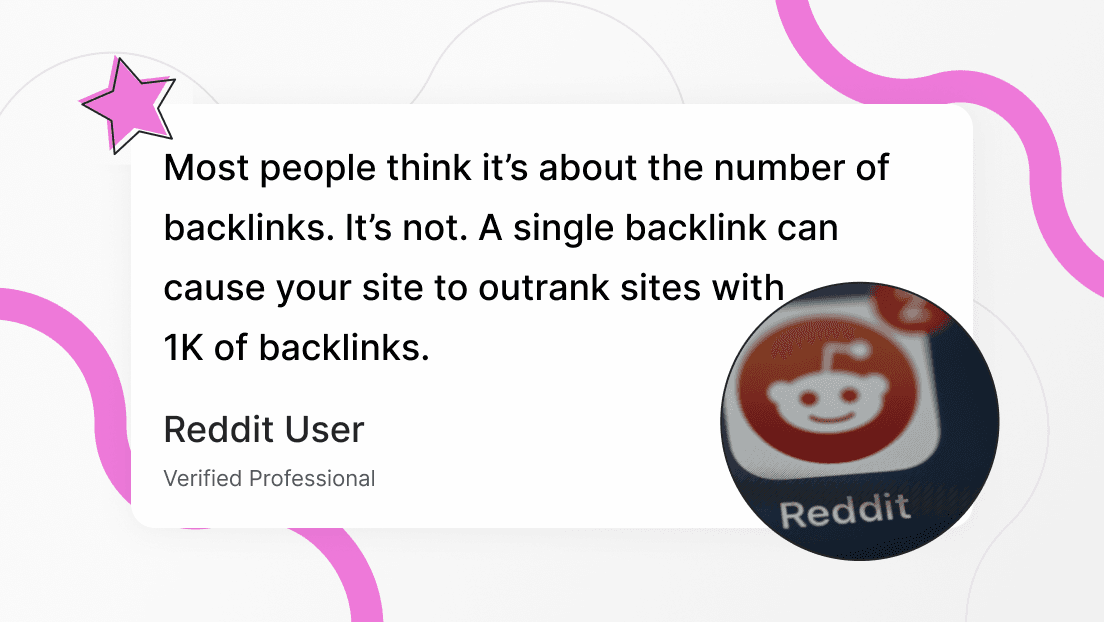
Domain Rating Is Just a Number
I’m not saying DR is not important, just that it’s not the only thing that matters when looking for placements for your backlinks. You should also check if it’s going to drive qualified traffic to your site? Ask yourself:
- Does this content speak to my target audience?
- Will people actually click through and be interested in my product?
- Is the backlink placed naturally within an article that builds trust, not suspicion?
If the answer’s “no,” the link might look nice in Ahrefs, but it won’t move your MRR.
Be Smart About Costs and Disclosure
SaaS backlinks are notoriously expensive—often 2–5x more than general links. That’s because publishers know you’re in a profitable niche. Negotiate transparently, avoid shady “permanent link” deals, and stay clear of networks that look too good to be true. Google’s algorithm and manual reviewers are getting sharper every quarter.
Also remember: disclosure matters. Sponsored links that aren’t marked as such are a direct violation of Google’s guidelines. One wrong placement can risk your domain’s trustworthiness.
Forget Link Buying: Here Comes Ranking Raccoon
If this all sounds like walking through a minefield, that’s because it kind of is. Buying backlinks for SaaS can work in the short term, it’s not a sustainable growth strategy. By joining Ranking Raccoon you choose a safer (or should I say—smarter?) path for your business to scale.
It’s a vetted networking platform where SaaS and tech brands, agencies, and marketers can collaborate, exchange mentions, and build organic backlinks—without any shady payments or spammy footprints.
Many SaaS brands already use Ranking Raccoon to boost their visibility while staying 100% within Google’s guidelines. You pay a simple membership fee (or there is a free version with limited features), not for individual links—and you get to connect with a network that understands you and shares your business goals.
In short: buying backlinks for SaaS is risky; building them with the right people isn’t.
Conclusion: Is Buying Backlinks Worth It?
Let’s be honest; link buying isn’t going anywhere. Sure, it’s risky, expensive, but still tempting as hell.
The truth is, every SEO professional pays somehow—whether it’s with money, time, or patience. But the smartest ones invest in relationships, not transactions.
Because even the best-paid links can’t replace trust, authority, and real relationships. You can pay for placement, but you can’t buy reputation. You can chase quick wins, but real SEO takes patience — and partners who play the long game.
If you want sustainable rankings, focus on what can’t be penalized: genuine partnerships, valuable content, and ethical collaboration. Platforms like Ranking Raccoon aren’t here to sell shortcuts—they exist to build bridges between trustworthy professionals who believe in growth that lasts.

Eliza Forgacs
Marketing Manager